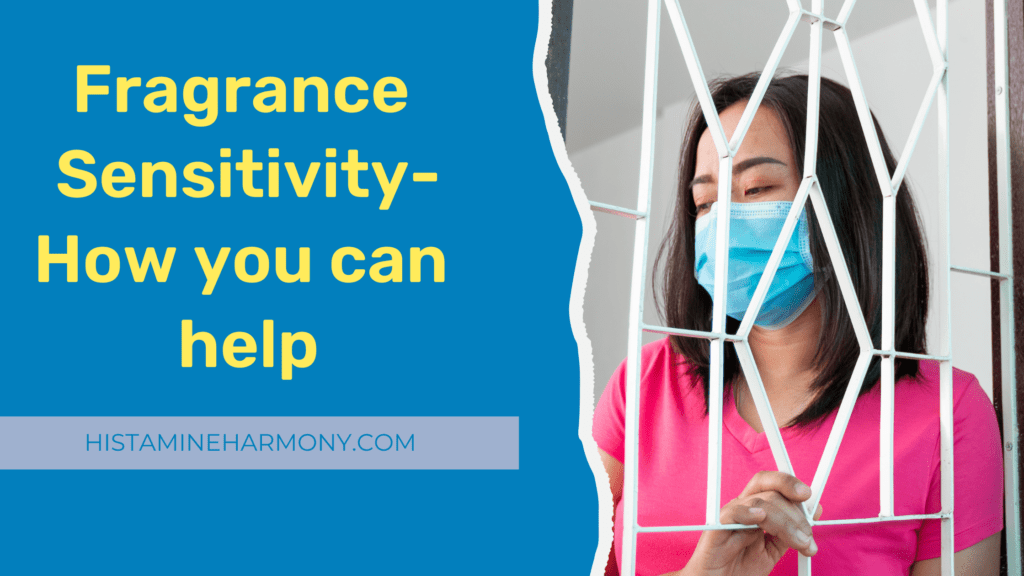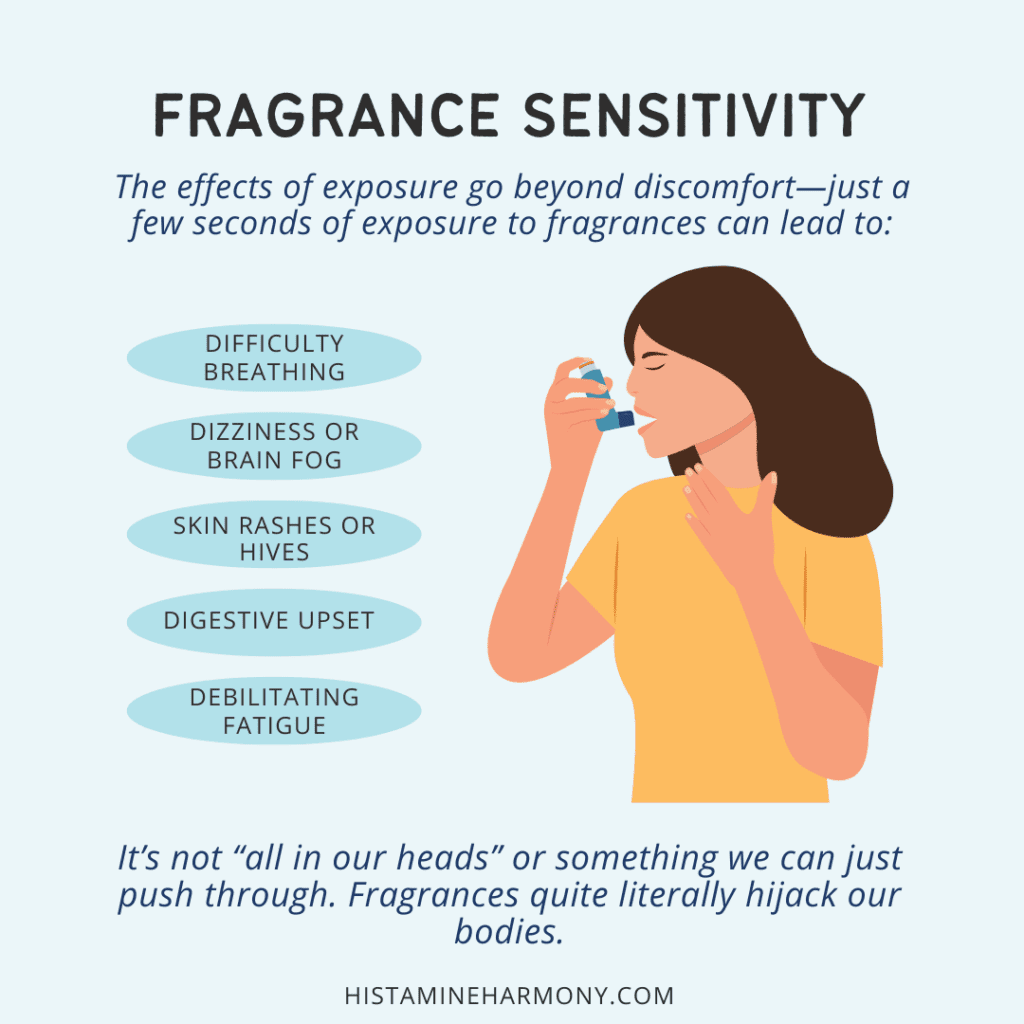Fragrance Sensitivity Awareness: It’s Not Just a Preference—It’s a Health Need
Fragrance sensitivity is more than a minor inconvenience—it can have a profound impact on a person’s quality of life. If you’ve ever been asked to avoid wearing perfume or using certain products around a coworker or loved one, you might have wondered why something that smells nice could cause so much trouble. For those of us living with conditions like mast cell activation syndrome (MCAS), histamine intolerance, or autoimmune disorder, fragrances are more than a mild annoyance—they’re a serious health trigger.
Fragrances are often made with synthetic chemicals that irritate sensitive immune systems. Even products labeled as natural or lightly scented can cause a cascade of symptoms, including migraines, rashes, breathing difficulties, and even days-long flare-ups.
This blog post is a resource for you—the friends, family, and loved ones who want to help but might not fully understand why avoiding fragrances is so important.

What Happens When a Person with Fragrance Sensitivity is Exposed?
The effects of exposure go beyond discomfort. For someone like me—or your loved one—just a few seconds of exposure to fragrances can lead to:
- Severe headaches or migraines
- Dizziness or brain fog
- Difficulty breathing (think of it like trying to breathe through a straw)
- Skin rashes or hives
- Digestive upset like nausea and bloating
- Debilitating fatigue or other systemic inflammation
It’s not “all in our heads” or something we can just push through. Fragrances quite literally hijack our bodies.

How Chemicals in Fragrances Can Trigger Health Issues
Fragrances often contain a cocktail of synthetic chemicals designed to create long-lasting scents. While these might smell pleasant, many of these ingredients can have harmful effects on health, especially for individuals with sensitivities, compromised immune systems, or chronic conditions like MCAS, histamine intolerance, or autoimmunity. Two of the most concerning types of chemicals commonly found in fragrances are phthalates and parabens.
Phthalates: The “Fixative” Chemicals
Phthalates are used in fragrances as fixatives, helping scents last longer. They’re found in many scented products, from perfumes and air fresheners to cleaning supplies. However, phthalates have been linked to:
- Endocrine Disruption: Phthalates interfere with hormone function, which can worsen immune and histamine-related conditions.
- Respiratory Irritation: Exposure can trigger coughing, wheezing, and difficulty breathing, particularly for individuals with overactive mast cells or lung conditions like asthma and COPD.
- Developmental and Reproductive Health Risks: Some studies suggest that long-term exposure may contribute to reproductive and developmental issues.
For those with chronic conditions, even low-level exposure can tip the immune system into overdrive, leading to inflammation and symptom flare-ups.
Parabens: Preservatives with Hidden Risks
Parabens are chemical preservatives commonly used in personal care products, including fragranced lotions, shampoos, and cosmetics. They help prevent microbial growth, but at a cost:
- Mimicking Estrogen: Parabens are known to act as endocrine disruptors, mimicking estrogen in the body. This can create hormonal imbalances and exacerbate symptoms of hormone-sensitive conditions.
- Histamine Release: For individuals with histamine intolerance, chronic hives, or MCAS, parabens may provoke mast cell degranulation, leading to the release of histamine and other chemical mediators, which can worsen symptoms such as itching, rashes, and headaches.
The Synergistic Effect of Multiple Chemicals
One of the biggest issues with fragranced products is the cumulative exposure to dozens, if not hundreds, of synthetic chemicals. The effects of these chemicals don’t occur in isolation. Especially for sensitive individuals, exposure to even trace amounts of phthalates, parabens, and other synthetic ingredients can combine to overwhelm the body’s natural detoxification pathways.
Understanding these risks is a crucial step toward creating safer environments for your loved ones. By choosing fragrance-free products, you’re helping reduce their exposure to these harmful chemicals and supporting their health in a meaningful way.
How You Can Help (And Why It Matters)
Supporting someone with fragrance sensitivity is about more than avoiding a spritz of perfume—it’s about showing that their health and comfort are a priority. Here’s how you can make a difference:
- Switch to Fragrance-Free Products
Whether it’s laundry detergent, hand soap, or cleaning supplies, opt for items labeled “fragrance-free” (not just “unscented”, which can still contain masking fragrances). - Skip Perfume and Scented Lotions
Before visiting, skip applying anything with a fragrance, even if it seems light or mild to you. - Put away “air fresheners” Unplug those plugins and put out scented candles as soon as possible if your loved one with fragrance sensitivities will be coming for a visit
- Think Beyond the Obvious
Scent can linger in fabrics, furniture, and even hair products. Being mindful of these subtle sources can make a huge difference. Opening a window and allowing the room to air out before a visit can help minimize the lingering effects. - Communicate Openly
Ask your loved one what accommodations they need and be patient as they explain. The more informed you are, the better you can help. - Further Research Check out this article about managing the environment to support someone with MCAS for a more in depth guide.
A Note About Emotional Impact
Living with fragrance sensitivity can feel isolating. Many of us hesitate to speak up because we don’t want to inconvenience others. By taking steps to reduce fragrances in shared spaces, you’re not just helping physically—you’re also showing your loved one that they’re valued and understood.
Living with fragrance sensitivity makes it difficult to do things that others don’t have to think about. A walk through the grocery store, a visit with a well-meaning but uninformed friend, or a day at the office can trigger a variety of symptoms and leave your loved one feeling like they can’t leave their home without a flare. Your support can make a meaningful impact on not only their physical health, but their mental health as well.